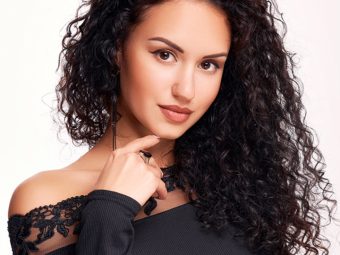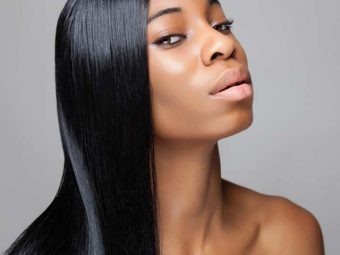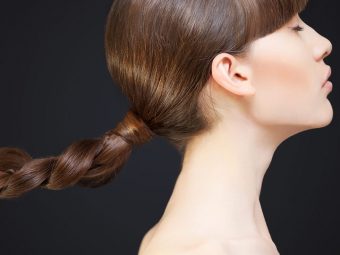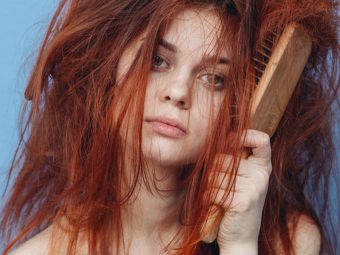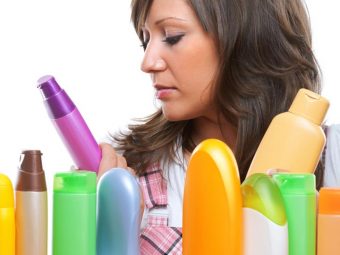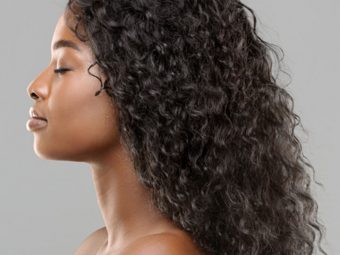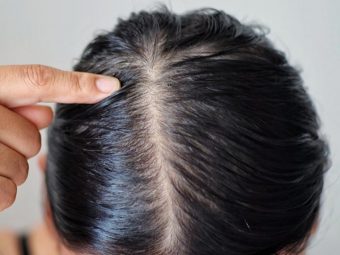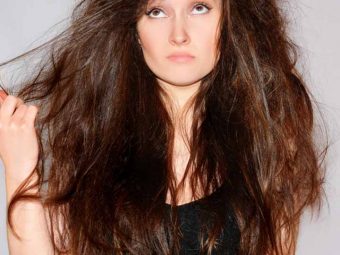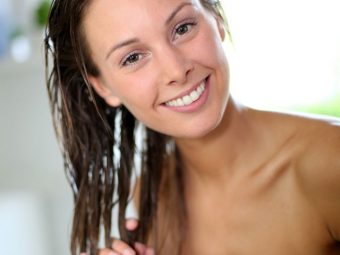Hair Conditioner – Benefits And How To Use It
Your hair needs this step in your hair wash routine for a nourished and smooth texture.
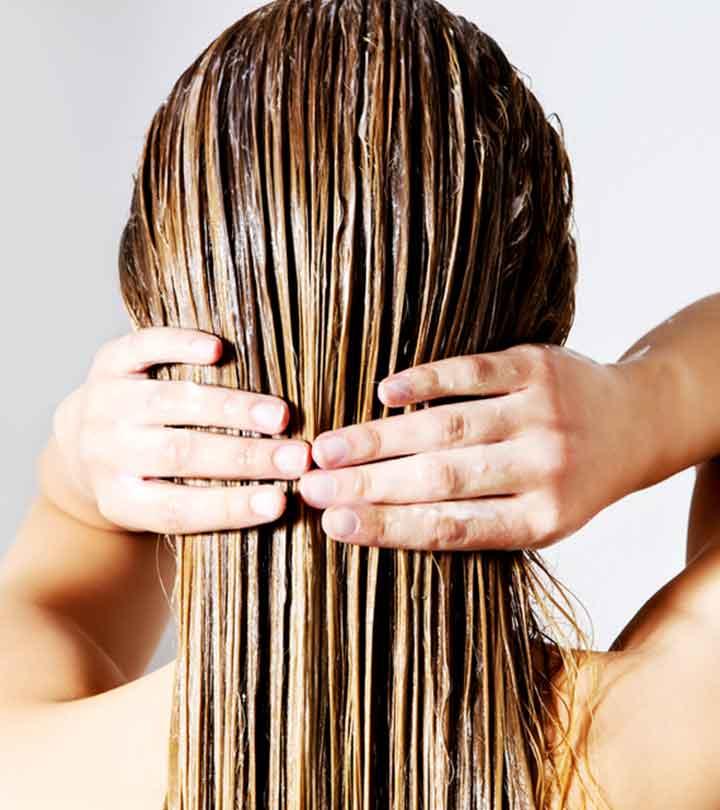
It is hard to keep your hair nourished and manageable without a hair conditioner, thanks to its moisturizing and repairing capabilities. But how does a conditioner stand out from the numerous hair care products out in the market? Can you use the same conditioner for all hair types? We have answered all your queries right here. Also, the article explores how a conditioner works, its benefits, the types, and how to use it. Scroll down.
In This Article
What Is Conditioner?
Hair conditioner is a very common hair moisturizing product. It has a creamy, smooth texture that applies on the hair easily. It offers many benefits for hair care, like frizz control (1). They are made with cationic surfactants, polymers, thickening agents, emollients, and auxiliary emulsifiers.
- Cationic surfactants, considered the backbone of conditioners, help reduce static and frizz in hair.
- Polymers like hydrolyzed protein and polypeptides derived from collagen help moisturize hair.
- Fatty alcohols, waxes, salt, and gums are used as thickening agents.
- Natural or synthetic oils, waxes, and esters are used as emollients in conditioners.
- Silicone is the most commonly used synthetic oil in the making of conditioners as it offers superior hair shine, softness, and manageability.
Conditioners also contain bridging agents that increase absorption and build viscosity while adjusting the pH level of your hair.
There are many types of conditioners available on the market. Check them out below!
Types Of Conditioners
There are three basic types of hair conditioners:
- Regular Conditioners: They are made with anti-static and lubricating agents like polymers, waxes, oils, hydrolyzed amino acids, and cationic molecules. These compounds help moisturize the hair. Conditioners are made to penetrate the hair cuticle, so it affects the hair from within (1).
- Deep Conditioners: These conditioning products contain more concentrated ingredients. They are normally left on the hair for 20-30 minutes. They are used to rejuvenate and replenish dry and damaged hair.
- Leave-in Conditioners: These are water- or alcohol-based products that are not meant to be washed off. Leave-in products are better suited for curly hair, especially for combing wet hair.
Wondering what the benefits of using a conditioner are? Find out below!
Benefits Of Conditioners
- Anti-Frizz And Static Control: Conditioners are used to decrease any inter-fiber friction between the hair shafts (1). They also neutralize the negative electrical charge on hair fibers and improve fiber hydrophilicity. This provides frizz and static control.
- Improved Hair Appearance And Feel: They help detangle hair, thus improving hair manageability and combability (1). They also improve hair shine and smoothness.
- Hair Protection: It protects the hair by sealing the cuticle. Research shows that applying a conditioner after shampooing your hair can prevent any damage and dryness caused by the shampoo (2). It also protects the hair fiber surface (1). It can also be used to prevent any friction caused by anti-dandruff shampoos.
- Protein: Some conditioners also contain protein-derived compounds that may treat split ends (3).
- Repairs Hair Damage: Chemically-treated and/or bleached hair is more porous (1). This means that hair cuticles are left more open to damage. Hair conditioners can penetrate the cuticle and seal it from within to protect damaged hair. Conditioners also help moisturize your hair after any chemical or styling treatments (3).
Now that you know why hair conditioner is such a wonderful product, let’s check out how to use it!
How To Use A Conditioner
Conditioners can be used on a regular basis after shampooing your hair (1).
Procedure
- Make sure your hair is not dripping wet before you apply the conditioner. It should be applied through the length of your hair in long and fluid motions.
- It should not be applied to the scalp as conditioners contain concentrated chemicals.
- Leave the conditioner on for about 5 minutes.
- Rinse it off after 3-5 minutes.
Deep conditioners can be left on your hair for a slightly longer time, like 20-30 minutes (3). Leave-in conditioners don’t need to be rinsed out and can be left in the hair.
Different hair types require different conditioners. Check out the next section to find out more.
Conditioners For Different Hair Types
Conditioners are made for specific hair types or problems. You can find conditioners that cater to straight, wavy, and curly hair needs. While most conditioners contain the same basic ingredients, there may be some elements that are better suited to a particular hair type or hair issue.
- A regular conditioner can be used on straight and wavy hair as it won’t make the hair look oily or flat (1).
- Leave-in conditioners are better suited for curly hair as they improve hair manageability (1).
- Deep conditioners can be used for damaged and dry hair (3).
Now, let’s answer an important question.
How Often Should You Use A Conditioner?
Conditioners should be used every time you shampoo your hair as the shampoo may make your hair dry. Deep conditioners can be used as often as once a week, or as minimally as twice a month. Leave-in conditioners can be used every time you wash your hair.
Side Effects
Although conditioners are mainly safe for regular usage, there may be a few cases of adverse cases. Some conditioners may have a higher pH level, which may irritate your scalp and damage your hair (3). Some ingredients used in the making of conditioners may cause allergic reactions or contact dermatitis. It is advised to perform a patch test on your forearm or behind your ear to check for any allergic reactions or irritation.
Hair conditioners are products that contain emollients and surfactants that keep your hair moisturized. Some of the advantages of using a hair conditioner include frizz reduction, improved smoothness, and protection of your hair from further damage. Keep in mind that you should select a hair conditioner suitable to your hair type. For example, regular hair conditioners are suitable for straight and wavy hair, while leave-in conditioners are ideal for curly hair. While conditioners are safe for usage, some people may experience adverse reactions due to higher pH levels. Conduct a patch test to be sure.
Frequently Asked Questions
Is conditioner good for hair every day?
No, it is not recommended to use a conditioner daily. Excess use of conditioner can leave your hair looking greasy and weighed down.
Which is better: shampoo or conditioner?
Both products are used for different purposes. A shampoo cleanses your hair and scalp, while a conditioner moisturizes your hair.
Do conditioners cause hair loss?
Overusing conditioner may cause buildup on the scalp. This buildup mixes with excess sebum and dirt and clogs the pores. This can lead to serious hair damage, including hair loss.
Can I use a conditioner without shampoo?
Yes, you can use a conditioner to moisturize your hair without using a shampoo. This method of cleansing is called co-washing.
How long should I leave the conditioner in my hair?
Regular conditioner can be left on your hair for 5-10 minutes. Deep conditioning treatments can be left for 15 minutes to an hour. Leave-in conditioner can be left in the hair without washing it off.
What is a natural hair conditioner?
There are two types of natural hair conditioners: ingredient-based and hair type-based. Conditioners made with natural ingredients are called natural hair conditioners. But, natural hair conditioners may also refer to conditioners made for natural hair types, like 3C to 4C hair. Hair type-based conditioners are made for specific hair types, like curly, straight, oily, or dry hair.
Can I mix shampoo and conditioner?
It is not recommended to mix these two products as shampoo is meant to cleanse the scalp and strip off excess sebum and other impurities. A conditioner moisturizes the hair and scalp.
Does conditioner clean hair?
No, conditioner moisturizes and hydrates your tresses.
Can I use oil instead of conditioner?
Yes, you can use oil instead of conditioner, but only for deep conditioning treatments. If you use oil as a regular conditioner, you should use it before shampooing.
Key Takeaways
- Hair conditioners hydrate your hair, keep it shiny and smooth, and prevent it from drying out.
- Many ingredients help conditioners keep your hair healthy, and they are available in different types.
- You should use a conditioner every time you shampoo to control frizz, tangles, and damage.
Sources
- Hair Cosmetics: An Overview
https://www.ncbi.nlm.nih.gov/pmc/articles/PMC4387693/ - Effect of shampoo, conditioner and permanent waving on the molecular structure of human hair
https://www.researchgate.net/publication/282444217_Effect_of_shampoo_conditioner_and_permanent_waving_on_the_molecular_structure_of_human_hair - Shampoo and Conditioners: What a Dermatologist Should Know?
https://www.ncbi.nlm.nih.gov/pmc/articles/PMC4458934/




